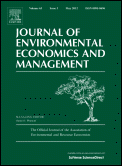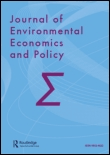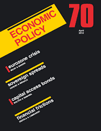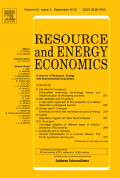
JOURNAL OF ENVIRONMENTAL ECONOMICS AND MANAGEMENT
Scope & Guideline
Navigating the Nexus of Economics and Environment.
Introduction
Aims and Scopes
- Environmental Policy Analysis:
This area focuses on the evaluation of environmental policies and regulations, examining their effectiveness, efficiency, and impacts on various sectors and demographics. - Economic Valuation of Environmental Goods:
Research in this scope seeks to quantify the economic value of natural resources and ecosystem services, utilizing methods such as contingent valuation, hedonic pricing, and cost-benefit analysis. - Behavioral Economics and Environmental Decision-Making:
This focus area explores how psychological factors, social norms, and behavioral nudges influence individuals' and organizations' environmental choices and actions. - Climate Change Economics:
The journal consistently addresses the economic implications of climate change, including mitigation strategies, adaptation measures, and the socio-economic impacts of climate policies. - Natural Resource Management:
This area examines the economic principles underlying the sustainable management of natural resources, including water, fisheries, and forests, and their interactions with economic systems. - Impact of Environmental Degradation on Human Health:
Research in this scope investigates the economic consequences of environmental pollution and degradation on public health outcomes, linking environmental quality to healthcare costs and productivity. - Interdisciplinary Approaches to Environmental Issues:
The journal encourages interdisciplinary research that integrates economic analysis with insights from ecology, sociology, and political science to address complex environmental challenges.
Trending and Emerging
- Integration of Behavioral Economics in Environmental Policy:
Recent publications highlight the role of behavioral economics in shaping effective environmental policies, emphasizing the importance of understanding human behavior and decision-making processes. - Climate Adaptation Strategies:
There is an increasing focus on research related to adaptation strategies in response to climate change, exploring how communities and economies can adjust to new environmental realities. - Circular Economy and Sustainable Practices:
Studies examining the transition to a circular economy, which emphasizes reuse and recycling, are gaining traction as societies seek sustainable alternatives to linear economic models. - Impact of Technology on Environmental Outcomes:
Emerging research explores the implications of technological advancements, such as renewable energy technologies and smart city innovations, on environmental sustainability and economic performance. - Environmental Justice and Equity:
A growing emphasis on environmental justice highlights the socio-economic disparities in environmental impacts and the need for equitable policy solutions that address these inequalities. - Interconnectedness of Global Environmental Issues:
Research increasingly recognizes the interconnectedness of global environmental challenges, such as climate change, biodiversity loss, and pollution, necessitating collaborative and synergistic approaches.
Declining or Waning
- Traditional Resource Extraction Economics:
Research focusing solely on traditional resource extraction methods and their economic implications has decreased, likely due to a growing emphasis on sustainable practices and renewable resources. - Static Models in Environmental Economics:
There has been a noticeable decline in the use of static economic models that do not account for dynamic environmental changes and feedback loops, as the field increasingly favors dynamic and adaptive modeling approaches. - Single-Dimensional Environmental Impact Assessments:
The trend toward comprehensive assessments that consider multiple dimensions of environmental impacts has overshadowed studies that only evaluate single-factor impacts, leading to a decline in their publication. - Generalized Economic Equilibrium Models:
While still relevant, the use of generalized equilibrium models in environmental economics has waned as researchers seek more nuanced, sector-specific analyses that better capture the complexities of environmental issues. - Environmental Economics without Behavioral Insights:
There is a decreasing focus on purely economic analyses that do not incorporate behavioral insights, as the field recognizes the importance of understanding human behavior in addressing environmental challenges.
Similar Journals

Journal of Environmental Economics and Policy
Driving Change with Economic Perspectives on Environmental IssuesThe Journal of Environmental Economics and Policy, published by Routledge Journals, Taylor & Francis Ltd, serves as a premier platform for researchers, policymakers, and scholars focused on the interlinkages between environmental issues and economic principles. With an ISSN of 2160-6544 and an E-ISSN of 2160-6552, this esteemed journal has achieved a commendable positioning in the academic community, securing a Q2 rating in key fields such as Economics and Econometrics, Environmental Science, and Management, Monitoring, Policy, and Law as of 2023. The journal has consistently been ranked in the upper tiers of its categories, reflecting its impact and relevance in contemporary environmental discussions. Operating from the United Kingdom, this journal is dedicated to publishing high-quality research articles, reviews, and case studies that contribute to the understanding of economic strategies in environmental governance and policy-making. With an address at 2-4 Park Square, Milton Park, Abingdon OX14 4RN, Oxon, England, it invites contributions that address pressing ecological challenges through an economic lens, fostering an interdisciplinary dialogue crucial for sustainable development. Although not an open access journal, it remains influential in shaping policies and practices that align economic growth with environmental sustainability.

ECONOMIC THEORY
Unveiling New Perspectives in Economic TheoryECONOMIC THEORY is a leading academic journal published by Springer, dedicated to advancing the field of economics through the dissemination of innovative and high-quality research. Established in 1991, this journal has become a crucial resource for researchers, professionals, and students interested in theoretical economics and econometrics. With a strong reputation, it ranks in the Q1 category for Economics and Econometrics as of 2023, exemplifying its influence and contribution to the discourse in the field. The journal operates without Open Access options, ensuring that all published content undergoes rigorous peer-review, maintaining scholarly integrity. Scholars can access the journal's rich compendium of articles that delve into diverse economic theories, providing invaluable insights and fostering academic dialogue. Headquartered in Germany, ECONOMIC THEORY is committed to shaping the future of economic research and serving as a cornerstone in the academic community.

Zhurnal Novaya Ekonomicheskaya Assotsiatsiya-Journal of the New Economic Association
Transforming Economic Understanding with Rigorous ResearchZhurnal Novaya Ekonomicheskaya Assotsiatsiya-Journal of the New Economic Association, published by CONSAS CONFERENCE, is a pivotal platform for advancing research in the fields of economics and finance. With an ISSN of 2221-2264, this journal facilitates the dissemination of innovative and insightful research findings that contribute to the understanding of contemporary economic issues. Operating as an open-access journal, it ensures broad accessibility for researchers, professionals, and students engaged in economic studies. The journal’s recent recognition within the Q4 category in Economics and Econometrics, alongside a Q3 classification in Finance for 2023, highlights its growing significance within the academic community. Despite its relatively nascent journey from 2016 to 2024, the journal, based in the Russian Federation with an address at VAN DER STERR BLDG, RHODES DR, MOWBRAY 7785, SOUTH AFRICA, contributes crucial scholarly dialogue by welcoming diverse perspectives and methodologies. By prioritizing rigorous research and comprehensive review processes, it aims to elevate the standards of economic discourse and facilitate impactful exchanges among scholars worldwide.

GLOBAL JOURNAL OF ENVIRONMENTAL SCIENCE AND MANAGEMENT-GJESM
Exploring the intersections of science, management, and sustainability.Global Journal of Environmental Science and Management (GJESM), published under the distinguished leadership of Professor J. Nouri, is an esteemed academic platform dedicated to advancing the interdisciplinary discourse surrounding environmental science and management. With an ISSN of 2383-3572 and an E-ISSN of 2383-3866, GJESM has established itself as a prominent Open Access journal since 2014, allowing for unrestricted sharing of knowledge and research findings. Based in Iran, this journal caters to a diverse global audience, featuring contributions that span various critical domains including agricultural and biological sciences, environmental engineering, pollution management, and social sciences, evidenced by its impressive 2023 Q1 and Q2 quartile rankings across multiple categories. The journal’s Scopus rankings demonstrate a robust standing in the academic landscape, with exciting placements that underscore its relevance in key fields. By bridging the gap between scientific inquiry and practical application, GJESM serves as a vital resource for researchers, practitioners, and students seeking to understand and address the pressing environmental challenges faced by our planet today.

ENVIRONMENT AND DEVELOPMENT ECONOMICS
Connecting Environmental Insight with Economic StrategyEnvironment and Development Economics, published by Cambridge University Press, stands as a pivotal journal in the fields of development economics and environmental science. With a robust ISSN of 1355-770X and an E-ISSN of 1469-4395, this esteemed publication has been a significant contributor to scholarly discourse since its inception in 1996 and continues to thrive with a convergence of research insights expected to run until 2024. Distinguished by its Q1 status in Development and its Q2 rankings in both Economics and Econometrics and Environmental Science (Miscellaneous) for 2023, the journal reflects its commitment to high-impact research. Notably, it ranks 58th out of 306 in Social Sciences Development and maintains respectable standings in other categories, emphasizing its importance in shaping policies and practices at the intersection of economics and environmental sustainability. Researchers, professionals, and students engaged in these disciplines can access this journal for thought-provoking articles that advance understanding of economic development while addressing environmental challenges.

ECONOMIC POLICY
Cutting-edge Insights into Policy and PracticeECONOMIC POLICY is a leading academic journal published by Oxford University Press, focusing on a broad spectrum of topics within the field of economics and related disciplines. With its ISSN 0266-4658 and E-ISSN 1468-0327, the journal serves as a vital platform for disseminating cutting-edge research and innovative policy analysis critical to both scholars and practitioners. As a testament to its quality and significance, ECONOMIC POLICY is classified in the Q1 quartile for both Economics and Econometrics and Management, Monitoring, Policy, and Law, and boasts impressive rankings within Scopus—placing it in the top 25% of its respective fields. Operating from the esteemed Oxford campus in the United Kingdom, the journal has produced a wealth of knowledge since its inception in 1988, with plans to continue shaping economic discourse through 2024 and beyond. While the journal does not offer Open Access options, it remains a cornerstone for anyone dedicated to understanding the complexities of economic policy and its impact on global society.

ENVIRONMENTAL MANAGEMENT
Advancing sustainability through rigorous research.ENVIRONMENTAL MANAGEMENT, published by Springer, stands at the forefront of advancing sustainability and ecological stewardship in the fields of Ecology, Global and Planetary Change, and Pollution. With an impressive tracking history from 1977 to 2024 and prestigious quartile rankings reflecting its significant impact (Q1 in Ecology and Q2 in both Global and Planetary Change and Pollution), this journal engages a wide range of stakeholders, including researchers, policymakers, and environmental professionals. The journal is a vital resource for those dedicated to addressing pressing global environmental challenges, publishing rigorous interdisciplinary research that informs policy and practice. While it does not offer open access, its content remains accessible through institutional subscriptions. Located in the heart of New York, ENVIRONMENTAL MANAGEMENT is dedicated to fostering a substantive dialogue on innovative approaches to environmental preservation and management.

RESOURCE AND ENERGY ECONOMICS
Illuminating Economic Pathways in Resource ManagementRESOURCE AND ENERGY ECONOMICS is a premier academic journal published by ELSEVIER, specializing in the intricate fields of economics and econometrics with a particular focus on the intersection of resource management and energy policy. Established in 1993, the journal has been a vital platform for scholars and professionals, contributing to significant advancements in the understanding of economic aspects surrounding natural resources and energy systems. With an impressive impact factor and ranking in the top quartile (Q1) of its category, it is recognized for its rigorous peer-reviewed research that informs both academic inquiry and practical applications in the industry. The journal is based in the Netherlands and caters to a global audience, fostering interdisciplinary discussions aimed at addressing pressing environmental and economic challenges. Accessible primarily through institutional subscriptions, RESOURCE AND ENERGY ECONOMICS continues to shape the discourse in its field, making it an essential read for researchers, policymakers, and practitioners striving for innovative solutions in resource and energy economics.

Lesnoy Zhurnal-Forestry Journal
Exploring the Frontiers of Forestry ScienceLesnoy Zhurnal-Forestry Journal is a prominent academic publication dedicated to advancing the field of forestry and environmental sciences. Published by the Northern Arctic Federal University M. V. Lomonosov, this journal focuses on innovative research, practices, and policies related to forestry management and conservation. With an Open Access model established since 2015, the journal ensures widespread dissemination of knowledge and foster collaborative research across global scholarly communities. Located in Arkhangelsk, Russia, the Lesnoy Zhurnal appeals to researchers, professionals, and students alike, providing a platform for sharing valuable insights and addressing emerging challenges in forestry. Though specific metrics like HIndex and Scopus rankings are presently unlisted, the journal is committed to excellence and aims to enhance its visibility and impact within the scientific community. This publication is not only a critical resource for ongoing research but a key player in shaping sustainable forestry practices in a rapidly changing environment, making it indispensable for anyone involved in forestry and environmental studies.

Annual Review of Resource Economics
Illuminating the Path to Sustainable Resource UseThe Annual Review of Resource Economics is a premier journal published by Annual Reviews, focusing on the multifaceted field of economics with a particular emphasis on resource allocation, sustainability, and environmental impact. With an impressive impact factor and recognized as a Q1 journal in the 2023 category of Economics and Econometrics, it ranks in the top 90th percentile among its peers, specifically at #66 out of 716 in Scopus rankings. Since its inception in 2010, the journal has provided a vital platform for the dissemination of comprehensive reviews and critical analyses, serving as an essential resource for researchers, professionals, and students seeking to explore the dynamic intersections of economics and resource management. Its commitment to scholarly rigor without compromising accessibility makes it an indispensable asset to the academic community, contributing significantly to the discourse on resource economics in an ever-evolving global landscape. The journal does not currently offer open access, ensuring exclusive content for subscribers.